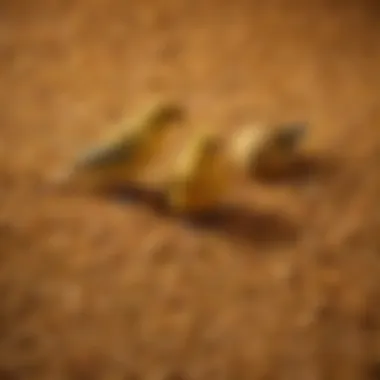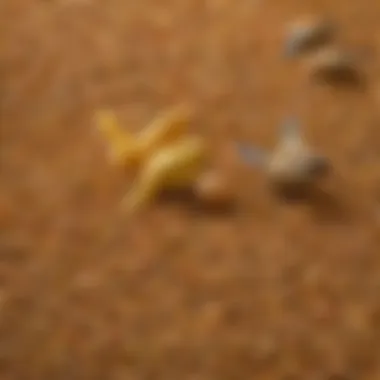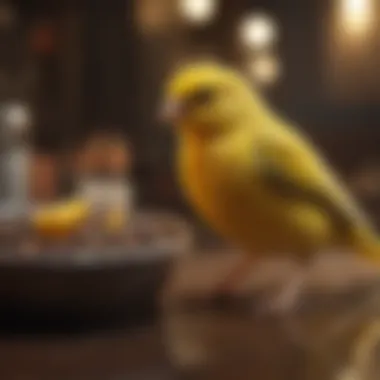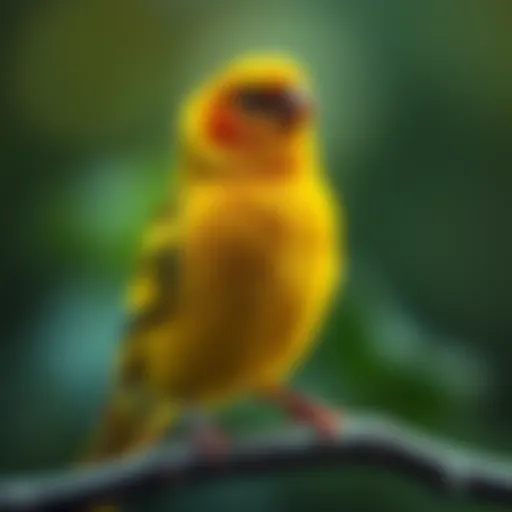Understanding Canary Pellet Food: A Complete Guide


Intro
Canaries, those bright little gems of the avian world, bring joy and melody into our lives. To support their vibrant spirit and health, understanding their dietary needs is crucial. One of the most debated topics among bird owners revolves around canary pellet food. This guide aims to unravel the mysteries surrounding these pellets, offering insights into their formulation and their role in dietary balance.
Proper nutrition is fundamental for any pet, especially for canaries. These birds require a specific mix of nutrients to thrive, minimizing risks of deficiency and health issues. While seeds have been the go-to choice for many, they lack certain essential elements in comparison to pellets. Let’s take a closer look.
Avian Care Basics
Importance of Proper Nutrition
Feeding canaries is more than just scattering seeds in their cage. We’re talking about a balanced diet that nurtures their growth and maintains their health. Pellets are crafted to deliver the necessary nutrients like proteins, vitamins, and minerals in a concentrated form. By choosing high-quality canary pellets, owners can ensure their feathered friends receive this balanced nutrition without the concern of overindulgence, which often happens with seeds.
Understanding Bird Species and Their Needs
Canaries, particularly popular breeds like the American Singer or the Gloster, have varying dietary needs that can influence their health. For instance, the American Singer has its unique preferences and specific nutritional requirements that differ from the traditional yellow canary. It’s essential to research and comprehend these differences to cater well to each type.
Basics of Birds Habitat Setup
The setup of a canary’s habitat must consider their comfort and health. A clean cage with ample cage space for flying is vital. Alongside proper nutrition, these birds also need safe toys and perches. Utilizing natural wood perches can prevent foot problems and provide a more natural living environment.
Grooming and Hygiene Tips
Maintaining hygiene in a canary’s living space is a pivotal aspect of enriching their life. Regular cage cleaning, replacing water daily, and providing bath options for your canary can contribute to better health. Birds naturally enjoy bathing, so adding a shallow dish occasionally will bring them joy and promote feather health.
Interacting with Your Pet Bird
Building Trust and Connection
Engaging with your canary can foster a delightful relationship. Start by speaking softly around them, giving them time to adjust to your presence. Gradually increasing your interactions will help them see you as a friendly figure.
Training Techniques and Tips
Canaries are intelligent creatures, and they can be trained with patience and persistence. Simple commands or cues can be introduced using positive reinforcement such as treats and affection. Remember, the goal is to make learning fun rather than a chore for your feathered friend.
Fun Activities for Bird Owners and Their Birds
Creating stimulating activities is vital in keeping canaries active and engaged. Hanging mirrors, gentle swings, and colorful toys can provide entertainment. Observe their reactions—if they show enthusiasm, you’ve hit the jackpot.
Recognizing Bird Cues and Behaviors
Birds communicate their feelings through body language. Understanding canary behavior can lead to better care. If they puff up, they might be feeling threatened, while singing indicates happiness or contentment. Pay attention to these cues to ensure their wellbeing.
Emotional Well-Being of Birds
The Role of Play and Socialization
Canaries thrive on social interactions, whether with their human caregivers or other birds. Setting up playtime where they can socialize while under supervision helps reduce loneliness.
Enhancing Birds' Emotional Health
Providing enrichment through toys, varied environments, and appropriate companionship can boost their emotional health. Like us, they need stimulation and variety in life.
Assessing Bird Stress and Remedies
Signs of stress in canaries can manifest in various ways, such as excessive preening or changes in vocalization. Understanding and recognizing these signs early can help mitigate undue stress, as a relaxed bird is a happy bird.
Building Strong Human-Bird Bonds
Investing time in your canary can create a strong bond that enriches both your lives. Regular, gentle interaction and affection can translate into mutual trust and companionship.
Bird Health and Safety
Common Health Issues and Prevention
Being proactive in a canary’s care can prevent many common health issues, such as respiratory problems and feather plucking. It’s essential to monitor their environment and diet closely.
Routine Veterinary Care
Routine check-ups are crucial to catch any potential health problems early on. Finding an avian veterinarian can make a significant difference in overall bird health.
Environmental Hazards to Avoid
Canaries are sensitive creatures. Be wary of spraying pesticides or using strong cleaning agents near their habitat. Proper ventilation is also key to prevent respiratory issues.
Signs of Illness or Distress
Watch for changes in behavior—loss of appetite, lethargy, or abnormal droppings can hint at underlying issues. Act swiftly to seek help if you notice these signs.
Fun Facts and Quirky Insights
Unique Traits of Popular Bird Species


Canaries, known for their stunning colors and melodious songs, each boast unique traits. The Hairy Canary, for example, impresses with its fuzzy plumage, while the Red Factor canary radiates vibrant hues.
Historical and Cultural Significance of Birds
Birds symbolize freedom and spirit in many cultures. Canaries have often been associated with optimism due to their joyful singing. This significance has made them a cherished companion throughout history.
Famous Bird Owners and Their Stories
Throughout history, notable figures have had close ties with canaries. Renowned artists, scholars, and even royalty have found comfort and joy in these small creatures, underscoring the deep connection humans share with birds.
This guide aims to open doors of understanding on canary pellet food and birds’ overall care. By knowing the needs, habits and behaviors of canaries, pet bird owners can ensure their avian companions live healthy and happy lives.
Prelude to Canary Nutrition
When it comes to canaries, understanding their nutritional needs is more than just a footnote in care guidelines; it's central to their health and vitality. Proper nutrition is not just about what to feed them, but how those food choices affect various aspects of their lives, from their plumage to their energy levels. A well-rounded diet can enhance their singing, prevent diseases, and even extend their lifespan. So, if you're an aspiring bird parent or an experienced caretaker, diving into the specifics of canary nutrition is absolutely essential.
The Importance of a Balanced Diet
A balanced diet for canaries, similar to what humans require, encompasses a variety of nutrients. Many pet owners may feel that offering a scoop of seed mix each day suffices, but that can be a two-edged sword. While seeds can be tasty, they may not supply all the necessary vitamins and minerals for your feathered friend. Think of it like trying to thrive on nothing but potato chips. Add to that the risk of obesity from seed-heavy diets, and you see why balance is key.
A wholesome diet should include proteins, fats, carbohydrates, vitamins, and minerals. Each macronutrient plays its part; for example, protein is necessary for cell growth and feathers, while vitamins can aid in metabolism and prevent deficiencies that lead to health issues. With the right balance, canaries will not only appear healthier but also display livelier behaviors and singing, making your home more vibrant.
Role of Pellets in Avian Diets
Pellets have gained traction in recent years among avian caretakers, and for good reason. Offering a pellet as a staple in a canary's diet helps ensure a more consistent intake of nutrients compared to seed mixes, which can be haphazard in their nutritional offerings. Unlike seeds, which can often lead to selective eating—where a bird picks favorites and leaves out vital nutrients—pellets deliver a formulated blend that generally meets a canary's complete dietary needs.
Moreover, it is important to note that not all pellets are created equal. There are many types, and they should be high-quality to avoid fillers or ingredients that could be harmful. One notable benefit is that pellets are specifically designed with the dietary needs of birds in mind, reducing the risk of diseases linked to poor nutrition, such as obesity or liver problems.
In summary, exploring canary nutrition opens the door to ensuring that your pet thrives. A balanced diet aids in their physical condition and behavioral health, while pellets offer a convenient way to achieve this. So, before you feed your canary that beloved seed mix, consider the performance of pellets and how they can contribute to your bird's long-term health.
What are Canary Pellets?
Delving into the world of canary food brings us to an essential dietary component: canary pellets. For those new to avian care or looking to optimize their birds' nutrition, understanding what these pellets are and how they fit into a comprehensive diet is paramount. As canaries thrive on a diet that promotes their vibrant health and longevity, pellets have emerged at the forefront of avian nutrition.
Composition of Pellet Food
When it comes to the makeup of canary pellets, one has to appreciate that it's more than just a hard, round bite. These pellets are formulated thoughtfully, integrating a blend of core nutrients tailored to meet the needs of these lively little birds.
Typically, pellets are designed to contain a mix of the following elements:
- Grains: Such as oats and corn, providing necessary carbohydrates for energy.
- Seeds: While including in moderation, seeds often enhance the attractiveness to birds and offer some essential fatty acids.
- Vegetables: Dried or powdered forms of vegetables can deliver fiber and vitamins, contributing to digestive health.
- Supplemental Nutrients: Additional vitamins and minerals, such as calcium and vitamin D3, support bone health and overall metabolic processes.
The ideal composition ensures that canaries receive a balanced meal each time they munch. As they nibble away, they’re not just filling their bellies; they’re putting nutrients into their little systems, which will affect everything from their bright plumage to their chirpy disposition.
Types of Ingredients in Pellets
Understanding the individual components can help pet bird owners make informed choices. The ingredients in canary pellets serve various roles, balancing the diet in a way that's not just palatable but also functional. Some of the key types of ingredients you may encounter include:
- Protein Sources: Primarily deriving from legumes and soy, proteins are essential for growth, feather development, and overall health. Every scoop of properly formulated pellets should contain a sufficient amount of these essential building blocks.
- Fats: Necessary for energy and also for insulating body heat, fats, often sourced from various seeds, need to be present in controlled quantities.
- Fiber: Important for gastrointestinal health, fiber from plant-based sources aids digestion and helps maintain intestinal flora. Birds like canaries need this to avoid bloating or other digestive upset.
- Flavoring Agents: Often found in better-quality pellets, these are more than just an enhancement to make food tastier; they can also serve to mimic the birds’ natural food preferences, encouraging a robust eating behavior.
"Birds thrive best when they mimic nature. Pellets make this easier by providing a varied diet in one neat package." - Avian Nutrition Expert
In summary, canary pellets form a foundation for a healthy diet, ensuring that every meal your canary eats can contribute towards their health and vibrancy. By choosing pellets with a diverse array of quality ingredients, bird owners can support the specific needs of their feathered friends while simplifying their feeding routines.
Nutritional Benefits of Canary Pellets
Canary pellets stand as a pivotal component in the diet of these lovely avian companions, delivering a wealth of essential nutrients through a meticulously crafted formulation. Understanding the nutritional benefits of canary pellets is paramount, not only for bird owners but for anyone who wishes to ensure the overall well-being of their feathered friends. This section delves into three critical aspects: proteins and amino acids, essential vitamins and minerals, and the significance of fiber in maintaining digestive health.
Proteins and Amino Acids
Proteins are the building blocks of life, and for canaries, they are essential for growth, development, and overall vitality. These birds, much like humans, require a balanced intake of amino acids to support their metabolic functions and body maintenance. It's crucial to recognize that canaries are not just seed-eating creatures. Pelleted food often comprises quality proteins derived from various sources, including plants, eggs, and even insects.
For example, ingredients like soybean meal and dried egg product contribute a rich amino acid profile. When selecting a pellet brand, look for those that specify they contain a complete amino acid spectrum. Your canary’s feathers, muscle tone, and even reproductive health hinge on this nutrient group. The right proteins can help develop a vibrant plumage and healthy bodily functions, making it a significant consideration.
Essential Vitamins and Minerals
The role of vitamins and minerals in the diet of canaries is often overlooked. But these micronutrients pack a punch when it comes to avian health. Vitamins such as A, C, E, and the B complex play critical roles that go beyond just energy production. They aid in immune function, feather health, and even skin integrity. A good pellet formula can provide these vital nutrients in a concentrated and easily digestible form.
Moreover, minerals such as calcium, phosphorus, and magnesium support bone density and reproductive health, particularly in breeding canaries. When looking at the nutritional information on pelleted food, keep an eye out for these ingredients as they should clearly be labeled. Remember, a balanced vitamin and mineral intake fosters resilience against diseases and promotes a healthy lifespan.
"A balanced diet for canaries is not just about feeding; it's about fostering a thriving life."
Fiber and Digestive Health
In addition to proteins and vitamins, fiber is an unsung hero in a canary’s diet. It plays a vital role in enhancing digestive health and promoting proper gut function. Pellets often contain fiber sources like alfalfa or beet pulp, which help regulate digestion, prevent constipation, and can even stave off obesity. A canary's digestive system is designed to process a variety of foods, but a diet too high in fats or certain carbohydrates can lead to health imbalances.
Including fiber-rich pellets allows for better nutrient absorption and can lead to a lively and energetic bird. Keeping an eye on your canary’s droppings can provide clues; healthy droppings should be firm and well-formed. If you observe issues, switching to a brand with higher fiber content may be prudent.
Overall, the nutritional benefits of canary pellets are not just statistics; they represent a holistic approach to feeding. By carefully choosing a high-quality pellet, threefold gains can be achieved: robust health, vibrant feathers, and awell-regulated digestive system.
Choosing the Right Pellet for Your Canary


Selecting the appropriate pellet for your canary is akin to finding the right key for a lock; it can make all the difference in ensuring your bird's health and happiness. The pellet you choose should cater specifically to your canary's needs, taking into account its breed, age, and health condition. As canaries can be sensitive to dietary changes, it is vital to carefully consider each element of their nutrition.
When navigating the vast market of canary pellets, you must be vigilant. Not all pellets are created equal, and some may contain ingredients that do not meet the specific nutritional requirements these birds have. The right choice not only supports their physical health but also impacts their behavior and overall wellbeing.
Considerations for Different Breeds
Just as people may have different dietary needs depending on their genetics and lifestyle, so do canaries. Each breed of canary has unique traits and preferences that influence their dietary requirements. For instance, a singing canary, known for its melodious tunes, may require a diet higher in certain nutrients that promote vocal health. In contrast, a color-bred canary might benefit from a formula enriched with pigments to enhance its plumage.
- Diet Variation: Research the specific pellet recipes aimed at your canary’s breed.
- Nutrient Ratios: Some breeds, such as the roller canary, might thrive on higher fat content to support their energetic demands, while others may need a focus on protein.
Keep in mind that the age of the bird also plays a crucial role. Young canaries need more protein and fat to support their growth, while older canaries may require a diet that supports renal health and weight management.
Assessing Age and Health Needs
As your canary transitions through different life stages, its nutritional needs change as well. A diet that suits a sprightly young canary might do very little for an older one that has slowed down.
- Young Canaries: Formulas high in protein and energy are essential for their development.
- Adult Canaries: A well-balanced mix that maintains energy levels minus the excess fat.
- Senior Canaries: The older generation may benefit from specialized pellets that support joints and decrease calorie intake to prevent obesity.
Health conditions should also be considered when selecting pellets. If your canary is ill or recuperating, consult your avian vet about dietary adjustments. Some might require pellets designed to assist in recovery or manage health issues.
"Choosing the right feed is like choosing a good partner; it should match your needs for a harmonious and fulfilling life."
In summary, finding the right pellet for your canary is more than a straightforward purchase. It requires an understanding of your bird's breed, age, and health situation. The investment in thoughtful selection pays off in a happier, healthier feathered friend.
Feeding Practices
Feeding practices are pivotal in ensuring that canaries receive the optimal nutrition they require for a healthy and vibrant life. By focusing on portion sizes and the combination of foods in their diet, bird owners can significantly impact their pet's wellbeing. This section will explore crucial aspects of feeding practices, providing valuable insights that can aid in maintaining pet health and happiness.
Determining the Right Portion Size
Getting the portion size right can be a puzzle for many canary owners. Too little food can lead to undernourishment, while too much can create weight issues, leading to health complications. A good rule of thumb is to observe your canary's eating habits over time. Generally speaking, a healthy adult canary should consume about one to two teaspoons of pellets each day.
Start by measuring out this amount and observe how quickly it gets consumed. If your canary eats it all within just a few hours, consider increasing the portion slightly. Conversely, if food remains after a full day, you might need to trim back. Moreover, factors like age, activity level, and even the bird’s size should influence your decision on portions. Regular adjustments based on observation can help you hit the sweet spot.
"A bird’s nutrition reflects in its song; a well-fed canary sings the sweetest notes."
Combining Pellets with Other Foods
It's not a one-size-fits-all world when it comes to diet. While canary pellets can offer a complete source of nutrition, many experts recommend supplementing pellets with fresh foods for added variety and nutrients. Think of it like adding different spices to a dish—each ingredient brings its flavor and health benefits.
Consider these options for combining with pellets:
- Fresh Vegetables: Leafy greens like kale, spinach, and even diced bell peppers can offer essential vitamins.
- Fruits: Small pieces of apple or pear can be a delightful treat, but moderation is key due to sugar content.
- Grains: A bit of cooked brown rice or quinoa can add extra fiber.
When introducing new foods, do it gradually. Sudden changes can lead to digestive upset. Start by offering small amounts and observe if the canary enjoys them and reacts positively. Over time, you'll create a delicious mix that keeps your feathered friend engaged and healthy.
Combining different food types also promotes a balanced diet, helping to prevent diet monotony. Canaries thrive on variety and will likely become more enthusiastic eaters, thus benefiting from all the nutrients their diet can offer.
In summary, feeding your canary is more than just filling a bowl; it’s about evaluating portion sizes and thoughtfully selecting a mix to keep their diet diverse and nutritious.
Common Misconceptions About Canary Pellets
When it comes to feeding pet canaries, myths abound about what constitutes the ideal diet. These misconceptions can lead bird owners astray and impact their beloved pets’ health. Understanding the truth behind these ideas is pivotal for any pet bird owner, aspiring bird parents, or breeders aiming for the best welfare of their feathered companions.
Pellets vs. Seeds
The debate between pellets and seeds remains one of the most talked-about topics among canary owners. Many folks often believe that seeds are sufficient, assuming that since wild canaries eat seeds, it must be fine for pet canaries too. However, this idea is largely misguided. Regular seed mixtures seldom meet the full range of nutritional needs for canaries.
Let's break it down a bit:
- Nutrient Imbalance: Seeds tend to be high in fat and low in other crucial nutrients.
- Lack of Diversity: Relying solely on seeds can starve your canary of essential vitamins and minerals.
- Pellets as Complete Nutrition: In contrast, many pellets have been formulated with a balanced blend of nutrients to support a healthy avian diet. They often include essential vitamins, minerals, and proteins, which are especially key for active canaries.
- Preference Issues: It’s also common to find that canaries gradually develop a preference for seeds, as they tend to taste better to them compared to pellets. Training your canary to enjoy pellets, rather than seeds, is part of a responsible feeding strategy.
The Myth of Complete Diets
Another prevalent myth is the idea that a single type of food can fulfill all of a canary's nutritional needs. Some people might argue that if pellets are high quality, they should be enough to sustain a canary’s health all on their own. While this may seem logical, it doesn't hold up when you consider the health of the birds.
- Variety Matters: Just like humans, canaries benefit from a diet that includes variety. Supplementing pellets with fresh fruits, vegetables, and occasional seeds can add necessary nutrients not found in standard pellets.
- Different Health Needs: Canaries are not one-size-fits-all. They have varying health requirements based on age, breed, and health conditions. A complete diet for one bird might not be adequate for another.
- Regular Monitoring: Keeping an eye on your canary’s health is crucial. Increased weight, feather issues, or irregular behavior can be signs of dietary deficiencies.
In summary, while pellets are a key part of a canary's diet, they shouldn’t be the sole food source offered. Understanding these misconceptions helps create a more robust feeding routine that supports long-term health and vitality.
"Nutrition isn't just about filling a bowl; it's about crafting a healthful journey for your bird."
By diving into these topics, you’re already taking a step towards better care. Sometimes, just knowing the difference between a myth and a fact can shape how we approach the health of our pets.
Signs of a Healthy Diet
Understanding the signs of a healthy diet for canaries not only enriches the life of your feathered friend but also equips you as an owner with essential knowledge to keep their wellbeing in check. Birds, much like other pets, exhibit a range of signs that can inform you about their dietary health. Being observant can make all the difference.
Physical Health Indicators
When it comes to physical health, a canary’s appearance often speaks volumes about its nutrition. Some key signs to look for include:


- Feather Condition: Healthy canaries have sleek, vibrant feathers. If you notice any dullness, fraying, or missing plumes, it might be a sign that their diet lacks essential nutrients.
- Body Weight: A canary should maintain a balanced weight. Obesity can show itself through a plump belly and an inability to fly well. On the opposite end, underweight canaries may show prominent breast bones and a general lack of energy.
- Eye Clarity: Bright and clear eyes indicate good health, while dull or cloudy eyes can be a red flag for potential health issues stemming from improper nutrition.
- Droppings: Monitoring a canary’s droppings can be quite revealing. Healthy droppings should be firm and well-formed. Any drastic changes in color, consistency, or odor could suggest dietary imbalances.
Addressing these indicators effectively often calls for a closer assessment of the type of pellets being fed, their quantity, and overall feeding practices.
Behavioral Changes as Feeding Feedback
Behavioral cues also play an essential role in understanding your canary's reaction to its diet. Canaries are often expressive and their habits can point towards the adequacy of their nutritional intake. Pay attention to the following:
- Energy Levels: A canary that is well-fed will typically be active, chirpy, and engaged with its environment. A drop in enthusiasm may signify dietary deficiencies or illness.
- Social Interaction: Healthy canaries are sociable and enjoy interacting with their caretakers and other birds. A withdrawn canary might be more than just shy; it could hint at discomfort due to poor nutrition.
- Feeding Habits: Watch how your canary approaches its food. An eagerness to eat and a voracious appetite are good indicators. If your canary is hesitant or picky, it may be a sign that the diet does not meet its preferences or needs.
As an owner, reflecting on these behavioral changes can help make more informed feeding choices, ensuring lasting health and happiness for your canary.
Ample feeding practices lead to vibrant feathers and lively songs.
In summary, both physical health indicators and behavioral feedback are vital components in recognizing signs of a healthy diet for your canary. By being attentive and proactive, you can tailor your pet's diet to ensure it flourishes under your care.
Potential Risks of Poor Nutrition
When it comes to keeping canaries healthy, the importance of proper nutrition cannot be overstated. A poorly balanced diet can lead to a range of health issues that may endanger your bird's well-being and overall quality of life. Understanding the potential risks associated with inadequate nutrition helps bird owners take preventive measures and ensure their feathered friends thrive.
Common Health Issues Linked to Diet
A canary's diet significantly influences its health and longevity. When canaries do not get the right nutrients, they can develop several issues that might not appear immediately but could escalate quickly. A few of these common health problems include:
- Obesity: Just like with humans, a canary that eats too much of the wrong food can become overweight. Excessive fat can not only reduce their agility but also strain their heart and other organs.
- Feather Plucking: Nutritional deficiencies can lead to poor feather quality and even feather plucking. Birds often engage in this behavior due to discomfort or stress—symptoms that might be linked back to their diet.
- Liver Disease: Poor nutritional choices can lead to the accumulation of fat in the liver, leading to hepatic lipidosis, which is a serious health condition. This can be caused by a lack of essential vitamins and minerals.
- Digestive Issues: A diet high in seeds can lead to constipation, diarrhea, or other gastrointestinal problems due to a lack of fiber in their meals. Inadequate fiber hinders the digestive system from functioning properly.
"An ounce of prevention is worth a pound of cure." Keeping your canary's diet balanced is vital for avoiding these health issues.
Importance of Regular Veterinary Check-ups
Even with careful attention to diet, canaries still require regular veterinary check-ups. For instance, avian veterinarians can help detect any underlying health issues related to poor nutrition. A yearly visit allows for a thorough examination of your pet’s physical condition, providing a chance to assess:
- Weight Management: The vet will evaluate if your canary maintains a healthy weight, recommending dietary adjustments if necessary.
- Nutritional Deficiencies: Through blood work and other tests, vets can find out if your canary is lacking essential vitamins and minerals.
- Routine Health Screenings: These screenings help identify early signs of diseases linked to poor nutrition, such as fatty liver syndrome or respiratory issues.
- Dietary Recommendations: A vet can offer tailored advice based on your canary's age, breed, and lifestyle, ensuring they get the right dietary balance.
In summary, a canary's diet forms the backbone of its health. Recognizing the common health issues tied to poor nutrition and making veterinary check-ups a routine part of your care regimen are both essential steps in ensuring your pet's long-term health and vitality.
The End
In wrapping up discussions about canary pellet food, it's important to underscore that proper nutrition is not just a matter of feeding your canary; it is a cornerstone of its overall health and wellbeing. This article has outlined the crucial role that a balanced diet, particularly one that includes high-quality pellets, plays in ensuring that these small avian companions thrive. Key elements such as protein content, vitamins, minerals, and fibers found in pellets contribute vastly to a canary's physical health, feather condition, and even mood.
Moreover, we explored how different canary breeds might have varying dietary requirements, and the insights about age and health further cement the idea that there is no one-size-fits-all approach to feeding these birds. Close attention to specific needs is paramount to avoid the common pitfalls associated with poor nutrition.
The journey to understanding canary nutrition doesn't stop at knowing which pellets to use or how much to serve. It calls for keen observation of the bird’s behaviors and physical signs over time, creating a feedback loop of dietary improvement that can lead to numerous benefits for both the canary and its owner.
"A healthy canary sings the song of vibrant nutrition."
In essence, making informed decisions about your canary’s diet fosters not just better health, but also deeper connections between bird and owner. These choices pave the way for longer and brighter lives.
Summarizing the Importance of Proper Nutrition
To bring clarity to the importance of proper nutrition, we must consider that it directly affects the quality of life of a canary.
- Physical Health: A diet rich in the right nutrients strengthens the immune system, reducing susceptibility to illnesses and fostering longevity.
- Behavioral Health: Canaries that are well-nourished tend to exhibit more lively and engaging behaviors. This not only enhances their quality of life but also enriches the experience for their owners.
- Reproductive Health: For breeders, understanding the nutritional needs before and during the breeding season can result in healthier offspring.
The interplay between the nutritional elements of canary pellets and the overall health of these birds is irrefutable. Focusing on proper nutrition today can lead to a happier, healthier bird in the future.
Encouraging Informed Choices
Navigating the landscape of avian nutrition can feel like a daunting task, but fortunately, there are multiple resources available for canary owners. To make informed choices:
- Research: Utilize credible articles and resources, such as those found on Wikipedia or Britannica for in-depth knowledge.
- Reach Out: Engage with communities on platforms like Reddit or Facebook where fellow enthusiasts share experiences and advice.
- Consult Professionals: Regular check-ups with an avian veterinarian can provide tailored advice based on your canary’s unique needs.
Ultimately, knowledge equips owners to provide the best care possible, ensuring their canaries not only eat well but also live well.
Further Reading and Resources
Understanding the dietary needs of canaries extends far beyond simply placing pellets in a feeder. It's critical to delve into the broader context of avian nutrition, and that’s where further reading and resources come into play. These materials can enhance your knowledge, providing a well-rounded education on feeding practices and health management for your feathered friends. They also allow you to stay updated in a field that continuously evolves with new research and insights.
Expanding your resource library can help you grasp the nuances that aren’t typically covered in basic guides. The following sections focus particularly on recommended books and online communities that can provide invaluable support and information.
Recommended Books on Avian Nutrition
Books dedicated to avian nutrition present a treasure trove of information. They cover various topics, from the science behind bird digestion to specific dietary needs for different species. Here are a few notable titles:
- "The Health and Nutrition of Captive Parrots" by Rachel E. Cohen: Although this book primarily targets parrots, the insights on nutrition that apply across bird species can certainly benefit canary owners.
- "Dietary Requirements of Birds" by Alan H. K. Robinson: This expansive resource delves into dietary needs across various bird types and provides dietary guidelines that are beneficial for understanding canaries.
- "The Complete Book of Canary Care" by Peter G. Smith: A more specialized book that provides a comprehensive overview of canary care, including diet and nutrition tailored specifically for these birds.
Reading these materials not only aids in solidifying foundational knowledge, but also enhances the ability to make informed decisions regarding your canary's diet. The insights gained can lead to better juvenile growth rates, increased health in adult birds, and ultimately guide towards a longer, healthier life.
Online Forums and Communities for Canary Owners
Another valuable aspect of further learning is the camaraderie and shared experiences found in online communities. Forums and social media platforms are buzzing with discussions among canary enthusiasts. They can serve as informal classrooms where you gain insights straight from the experiences of fellow canary breeders and owners.
- Reddit’s r/canary: This dynamic subreddit is full of real-time discussions about basic to complex issues relating to canaries. From nutritional advice to troubleshooting health problems, the community is welcoming and ranges from beginners to seasoned bird owners.
- Facebook Groups: There are numerous groups dedicated to canary owners. They often share tips, photos, and even raise inquiries about specific diet changes or health concerns faced by their canaries.
- Avian Nutrition Online Workshops: Websites specializing in bird care often host online workshops and webinars. Participating in these sessions helps one stay informed about the latest findings and best practices in avian nutrition.
In sum, leaning into these resources enriches the journey of any bird owner. The knowledge, real-time support, and guidance you can obtain from a community or well-researched literature cannot be overstated.
"In learning, you will teach, and in teaching, you will learn." - Phil Collins
Through deeper engagement in these recommended resources, canary enthusiasts will find themselves better equipped to support the healthy nutrition of their birds while connecting with others who share the same passion.















